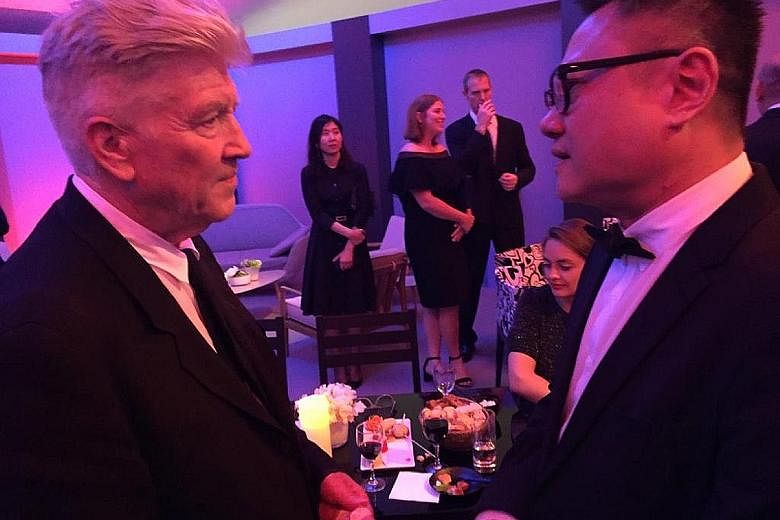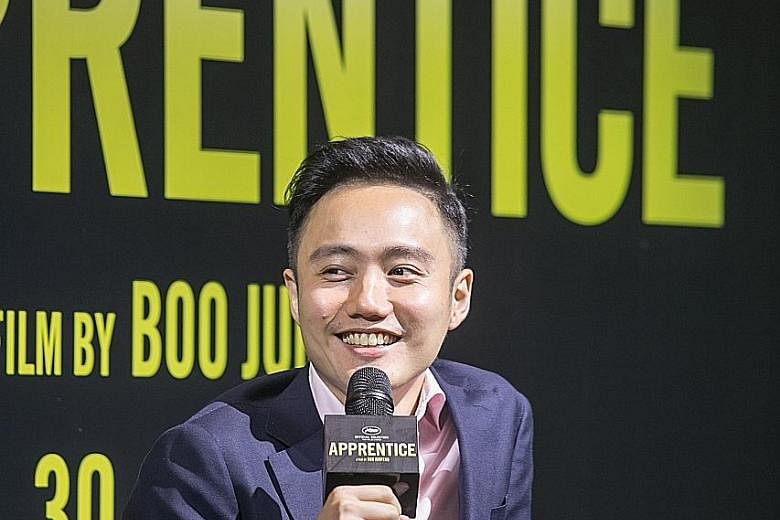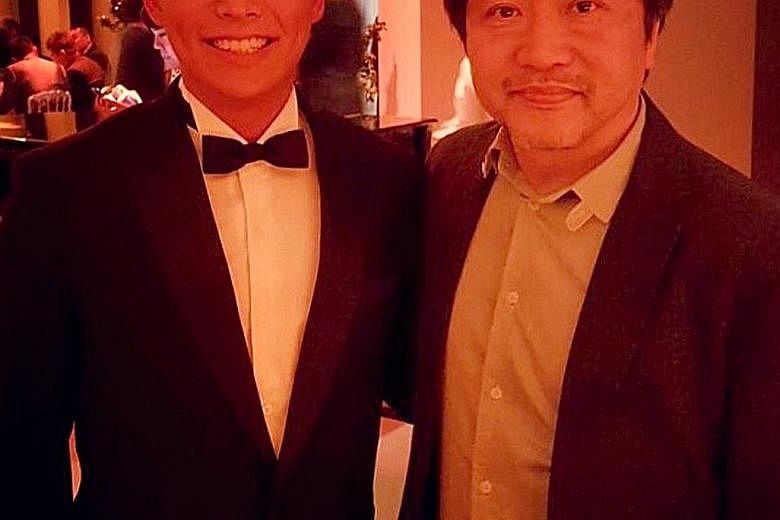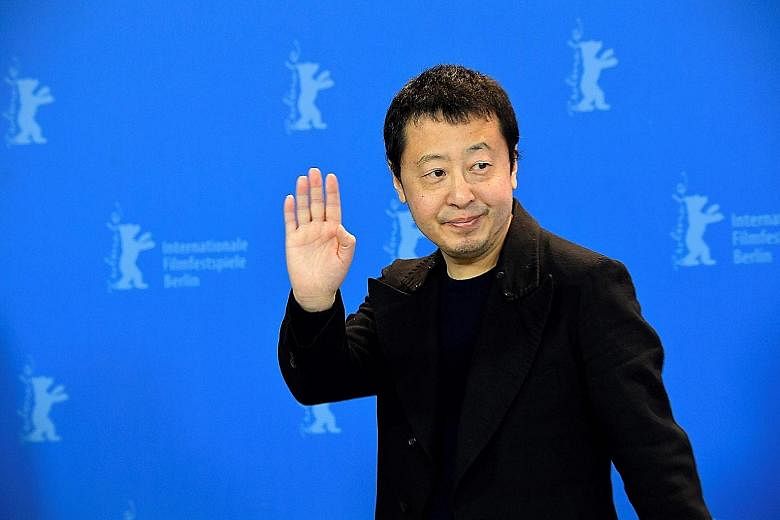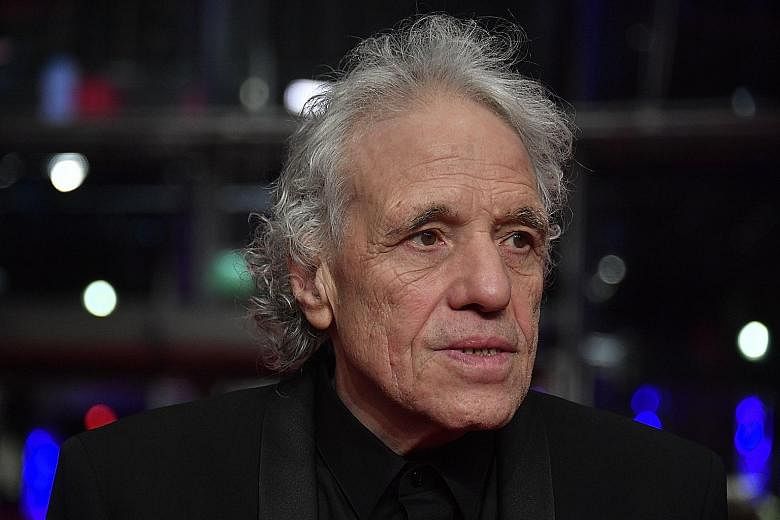There is nothing in the movie world that equals the glamour, artistic grandeur and occasional absurdity of the Cannes Film Festival, where stars and directors gather every May to be seen, celebrated and judged by the press and their peers.
Over a frenzied week and a half, masterpieces are unveiled and reputations are made.
There are rapturous ovations and lusty boos. This year, because of the coronavirus pandemic, none of that is happening, but we just can't quit it.
Film-makers around the world talk to The New York Times about their memories of Cannes and their thoughts about the future of cinema.
Over the last two decades, several Singaporean film-makers have made it to Cannes too. Three of them share with The Straits Times their memories of the world's glitziest film festival.
ERIC KHOO, 55
His heartland drama 12 Storeys played at the festival in 1997, followed by romance drama Be With Me in 2005, Tamil-language drama My Magic, which was the first Singapore film to compete for the Palme d'Or in 2008, and animated feature film Tatsumi in 2011.
"For me, the most meaningful moment was when My Magic was vying for the Palme d'Or. When we walked up the red carpet, they played the score from the movie, which was composed by my son Christopher, then 10 years old.
They did interviews with him and called him the youngest composer ever.
I had goosebumps. It was such a good feeling.
Another memory was the screening of Be With Me. It's a very silent film and I thought the chairs were rickety and moving quite a bit. I was worried about whether the audience were enjoying it.
It turned out they were hungry because when the food appeared, I could hear their stomachs growling. At the end, we had a standing ovation, which was fantastic.
The last time I was at Cannes was in 2017, when I was on the jury. There was a big closing party. I love my alcohol, so I really wanted to drink, but there was no food other than a huge tray of oysters.
I hated oysters but in a desperate attempt to fill my stomach, I ate 30 of them. Now, I love oysters.
I also had a great conversation with David Lynch. When I told him my favourite film was his The Straight Story (1999), a tear ran down his face."
Prisca Ang
BOO JUNFENG, 36
His semi-autobiographical first feature Sandcastle went to Cannes in 2010 and psychological drama Apprentice, in 2016.
"In 2010, my film Sandcastle was at Critics' Week for new film-makers. It was an eye-opening experience. You've heard about Cannes all your life and all your career. Now, we were there and able to present the film.
As a first-time film-maker, to arrive on the morning of your premiere and see long lines of people waiting to enter the cinema to see your film, it's just an incredible feeling. That was very special for me.
I was only 25 at the time, so to be able to get that kind of attention and read generally good reviews about the film was just very overwhelming.
But of course, there is a lot of work involved in going to Cannes. For the director, there are a lot of media interviews. It is the one time you're able to give the film a big publicity blast, to put it out there in the world and to get people interested.
In 2016 with Apprentice, it was very different. We were more experienced by then. The film was in the official selection, in Un Certain Regard. It was a bit more glitzy on the red carpet and the screening was a black tie event. It felt a lot grander in scale to be in the official selection. With that also comes even more publicity and interest, which meant even more work.
For both times, it was good that we could get our actors there. It was wonderful to be able to share that experience with them."
Prisca Ang
HUANG JUNXIANG, 31
Animated short film Piece Of Meat, which he directed with Jerrold Chong, played at the festival last year. He also produced Boo Junfeng's film Apprentice.
"I've been to the festival twice, once with Apprentice with Boo Junfeng, and a second time with Piece Of Meat. Being there is an overwhelming experience. You feel like a kid in a candy store and you meet so many of your idols.
I realised there are so many cultural differences among film-makers, but there is also a common goal in exploring who we are as people, with love and compassion. I also met Japanese director Hirokazu Kore-eda, who did Shoplifters (2018) and taking a photo with him was a major highlight.
Being at the festival last year with Jerrold to show our work Piece Of Meat was one of the biggest and proudest moments of my life.
To see the response and hear the audience laugh, to know the work communicates to a broader audience gives me confidence about how our Singaporean stories are quite universal.
Another memorable moment was when I was walking along a corridor on the way to a screening. I saw Quentin Tarantino chatting with jury head Alejandro Gonzalez Inarritu. I was starstruck because it was quite insane to be in such close proximity to them."
Prisca Ang
ALEJANDRO GONZALEZ INARRITU
His films at Cannes have included Babel in 2006.
"I went for the first time to the Cannes Film Festival to present Amores Perros (2000).
Actually, it was the first time I attended a film festival in my life. Our budget was so scarce that we decided to stay at a town 25 minutes outside Cannes since the rooms were much less expensive.
I was invited to a photo call with all the other directors just before a 7pm screening of the new Wong Kar Wai film In The Mood For Love.
Maria, my wife, and I thought that taking a taxi at 6.15pm would get us there just in time. We had no idea that taxis were overbooked, and even though we were dressed in a tuxedo and a long dress with heels, we had no other choice than to run.
It was 35 deg C outside, and as we ran, my wife took off her shoes. I took off my jacket, then my bow tie, then one, two, three buttons.
We arrived at 7.01 pm. I put my jacket on. I felt the sweat running over my whole body. Smile! Flash! Click! Flash! Cheeeese!
For a film-maker, the experience of entering that legendary Palais Des Festivals is similar to that of a Catholic boy going into the Vatican.
After watching In The Mood For Love, Maria and I walked in complete silence for almost 10 minutes. We suddenly stopped by the sea. Maria hugged me and started crying inconsolably on my shoulder. And I did the same on hers.
In The Mood For Love had left us deeply moved. It was that moment that reminded me why, even when it's so stupidly difficult sometimes, I wanted to become a film-maker."
JIA ZHANGKE
He has been a regular at Cannes; his films which played there include A Touch Of Sin (2013) and Ash Is Purest White (2018).
"I received a festival luncheon invitation in 2013. My English was not good; I was quite worn out.
When I arrived, I saw (festival director) Thierry Fremaux with Taiwanese film director Lee Ang and a man in a wheelchair. I went to say hello. Lee showed me to the man in the wheelchair and said, "Jia, Mr Bertolucci wants to talk to you."
"No kidding!" I said out loud. "This is Old B!"
It wasn't meant to be disrespectful. Bernardo Bertolucci had filmed The Last Emperor in China in 1987; Chinese film-makers would address him as "Old B" in a Chinese way, meaning that he's one of our own.
Bertolucci, holding my hand, started to talk. Lee translated: "How could I watch Useless? It's the only film that I haven't seen among your works."
I was overwhelmed. As a senior, Bertolucci was generous enough to speak highly of a junior. I was being noticed by him, which was the most inspiring thing of all.
In 2008, at the press conference for 24 City, Iranian film-maker Abbas Kiarostami stood at the door. I walked over and he gave me a big hug. We didn't say anything - he left in a hurry - but the warmth of the hug remained in me.
In 2015, at the photo call for Mountains May Depart, French director Agnes Varda suddenly appeared.
She was passing by, but she walked straight forward regardless of the flashes and cameras, one hand holding me and the other hand holding Zhao Tao (the actress and Jia's wife).
I later saw the photos of that day; Agnes had kept her eyes on us, full of affection like a grandmother.
Bertolucci, Kiarostami and Varda have sadly passed away, but at Cannes, they left their focus and warmth to the younger generation, which empowered us to stay alive and keep making films."
ABEL FERRARA
His Bad Lieutenant (1992), Body Snatchers (1993) and The Blackout (1997) have played at the festival.
"The night of the premiere of Body Snatchers, I was all set and in perfect time for the five-minute walk from the hotel to the Palais when I went to put the tie on. Only, there was no tie. I freaked.
The PR people were begging me to just button my shirt. 'You are the director; you don't need a tie.'
But I had a brilliant idea. I called room service and told (the waiter) I needed his clip-on bow tie and would give him US$50 for it. He refused, but (after) another 50 in French money, I got the use of the tie till midnight.
My wife and I made it to the red carpet exactly five minutes late, which to the people in charge was the equivalent of strangling de Gaulle in mid-salute.
Now, once upon another time, we were back with The Blackout. It wasn't in competition, but because Dennis Hopper and Beatrice Dalle and Claudia Schiffer were also in it, we were going to have a special out-of-competition screening.
I was there in plenty of time, sharp and tie-less and awaiting our actors.
I hear our PR person (with two cellphones) repeating, 'Okay, Beatrice is still in the bathroom. Okay, she is refusing to come out.' Then from the other phone, 'Claudia has finally put her shoes on. She just took them off.'
Forty-five minutes later, Beatrice and Claudia arrived.
No one ever said a word to Beatrice or Claudia, strutting down that carpet with all the lights in the world flashing."
ASIF KAPADIA
He has had two movies presented at the festival, including an Amy Winehouse documentary in 2015.
"If you're lucky, you can have a golden moment. For me, it was Amy. The Cannes screening was the beginning of this amazing journey we went on with that film. To have the crowd, the emotion that was in the room.
It was a late screening - it probably finished at 3am or something - to walk out into the darkness and wander off down the street kind of floating and then see the reviews are really positive.
You think, 'Oh, maybe we've got something here,' but you don't know.
For me, it's much more exciting, that stage, than the end of the stage, which is what award season becomes. That kind of becomes a chore. This is about the movie. This is about an audience queueing around the block and begging for tickets to get in.
And so why wouldn't you, if you love movies, want to experience it and share in it and, if you're lucky enough, have your own work out there?"
